Planning an outdoor event often comes with one big challenge—how to serve fresh, hot meals without a traditional kitchen. Mobile event kitchen rentals solve this problem by bringing professional-grade kitchen setups directly to your venue. Whether you’re organizing a wedding, food festival, corporate event, or private party, these mobile kitchens make on-site food preparation easy and efficient. Designed to work with your chosen catering team, these rentals include everything from ovens and griddles to sinks and refrigeration, helping you transform nearly any space into a safe, functional cooking environment.
Key Takeaways
- Mobile event kitchen rentals bring commercial-grade cooking setups to any event location.
- Options include food truck conversions, kitchen trailers, and modular pop-up kitchens.
- These kitchens support various catering teams and menu styles.
- Equipment includes ovens, fryers, sinks, and refrigeration to meet health and safety codes.
- Rentals are ideal for outdoor weddings, festivals, corporate retreats, and private parties.
- Booking involves equipment selection, logistics planning, and permit coordination.
What Are Full-Service Mobile Cooking Options and How Do They Work?
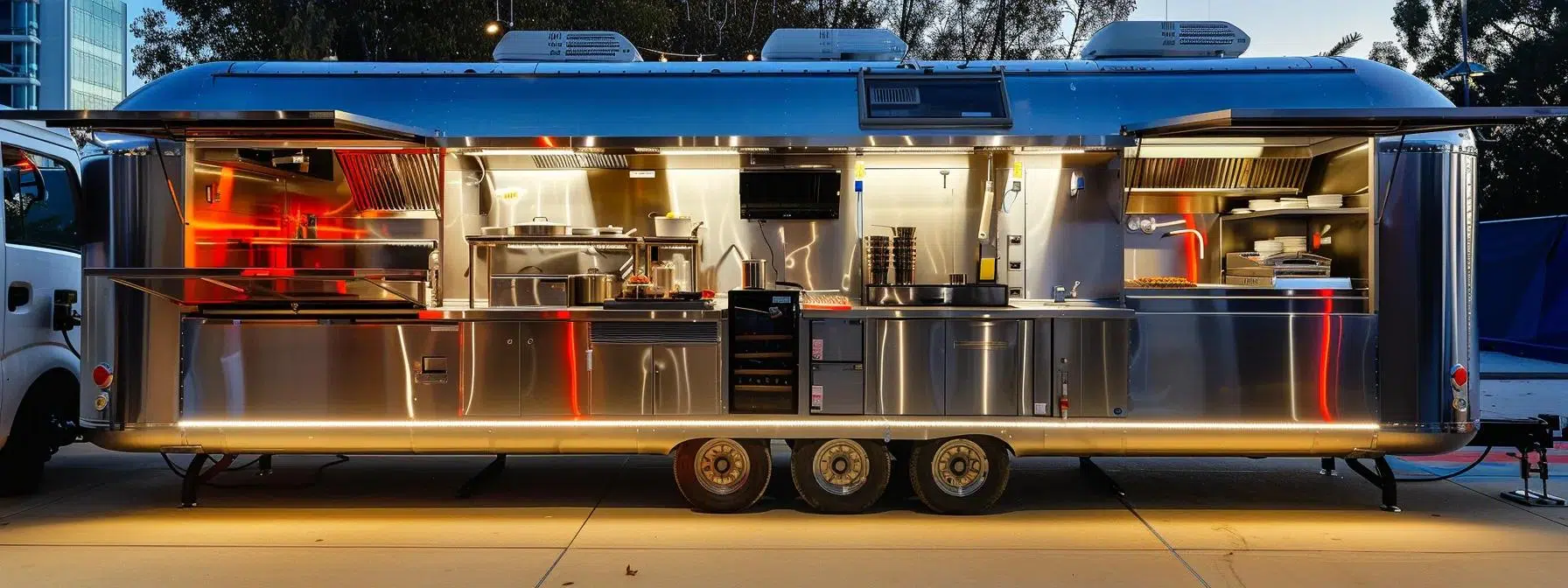
Full-service mobile kitchens are trailers or vehicles that have been converted into complete commercial cooking stations. These units come equipped with essential appliances such as convection ovens, griddles, deep fryers, refrigerators, sinks, dishwashers, and built-in fire suppression systems. Powered by diesel generators, electrical hookups, or onboard fuel tanks, they operate reliably—even in remote outdoor settings.
Mobile kitchens are built to meet local health and safety codes, making them ideal for events that require on-site food preparation without access to a traditional kitchen. Whether you’re hosting a festival, wedding, or corporate function, these units offer the flexibility and functionality of a restaurant kitchen—right at your event location.
What Is a Mobile Kitchen and What Types Are Available?
A mobile kitchen is a temporary, transportable kitchen unit designed to support full meal preparation at off-site locations. Common types include:
- Food Truck Conversions – Best for compact spaces and urban environments. These are ideal for small gatherings or street-style catering.
- Trailer Kitchens – Larger units with room for multiple cooking stations, prep counters, and ample storage. Perfect for high-guest-volume events.
- Pop-Up Kitchens – Modular setups assembled on-site. These are highly customizable and cost-effective for short-term or seasonal events.
Each option can be outfitted with essential equipment to ensure safety, efficiency, and compliance with local health regulations.
How Does Equipment Support On-Site Cooking?
Mobile kitchens are built with industrial-grade appliances to ensure smooth, efficient food service. Standard equipment includes:
- Convection ovens – For even, consistent baking.
- Deep fryers and griddles – For high-volume, versatile cooking.
- Refrigeration units – To keep perishables safe and fresh.
- Dishwashing stations and sinks – For proper cleaning and sanitation.
- Fire suppression systems – Typically integrated (e.g., Ansul systems) to meet safety codes.
This setup mirrors what you’d find in a commercial kitchen, making it easy for caterers to operate efficiently under tight event timelines.
How Can You Rent a Mobile Kitchen for Your Event?

Renting a mobile kitchen is a straightforward process that starts with understanding your event’s needs. Event rental providers typically offer flexible packages tailored to the size, location, and timeline of your event. These kitchens can be rented for just a few hours or several days, making them ideal for everything from small private parties to multi-day festivals. With the right planning, you can secure the equipment you need and ensure smooth day-of setup and operation—even on short notice.
What Are the Steps to Book a Mobile Kitchen Rental?
Securing a mobile kitchen rental involves four key steps:
- Research Providers – Look for experienced event rental companies that specialize in mobile kitchens. Review their equipment offerings, client testimonials, and available service areas.
- Consultation – Discuss your event details, including the location, guest count, kitchen size, power and water access, and any specific equipment needs.
- Booking – Finalize the rental agreement by selecting the appropriate kitchen type and equipment, confirming availability, and processing payment.
- Logistics Planning – Coordinate key details such as delivery and setup times, permit requirements, and venue access. Providers will often supply a pre-event checklist to help with preparation.
This structured approach ensures that your kitchen is fully operational and compliant on the day of your event.
Where Can You Find Mobile Kitchen Rentals Near You?
Mobile kitchen rentals are typically available through event rental companies that offer commercial-grade cooking setups. You can explore options by:
- Visiting provider websites with detailed kitchen descriptions and equipment lists.
- Browsing customer reviews and photo galleries of past events.
- Using local event directories or searching online with terms like “mobile kitchen rentals near me” or “event kitchen trailer rentals.”
- Attending trade shows or vendor expos where rental companies showcase equipment.
Working with a local or regional provider helps streamline logistics and reduce delivery fees.
What Are Typical Rental Durations and Availability?
Rental durations vary based on event type:
- Short-term rentals (4–6 hours) – Ideal for private gatherings, tastings, or micro-events.
- Full-day rentals – Common for weddings, fundraisers, and mid-size events.
- Multi-day rentals – Suitable for festivals, fairs, or corporate retreats.
It’s best to book several weeks in advance, especially during peak seasons. However, some providers offer last-minute rentals when availability permits—often with expedited setup services.
What Are the Different Types and Sizes of Mobile Kitchens?
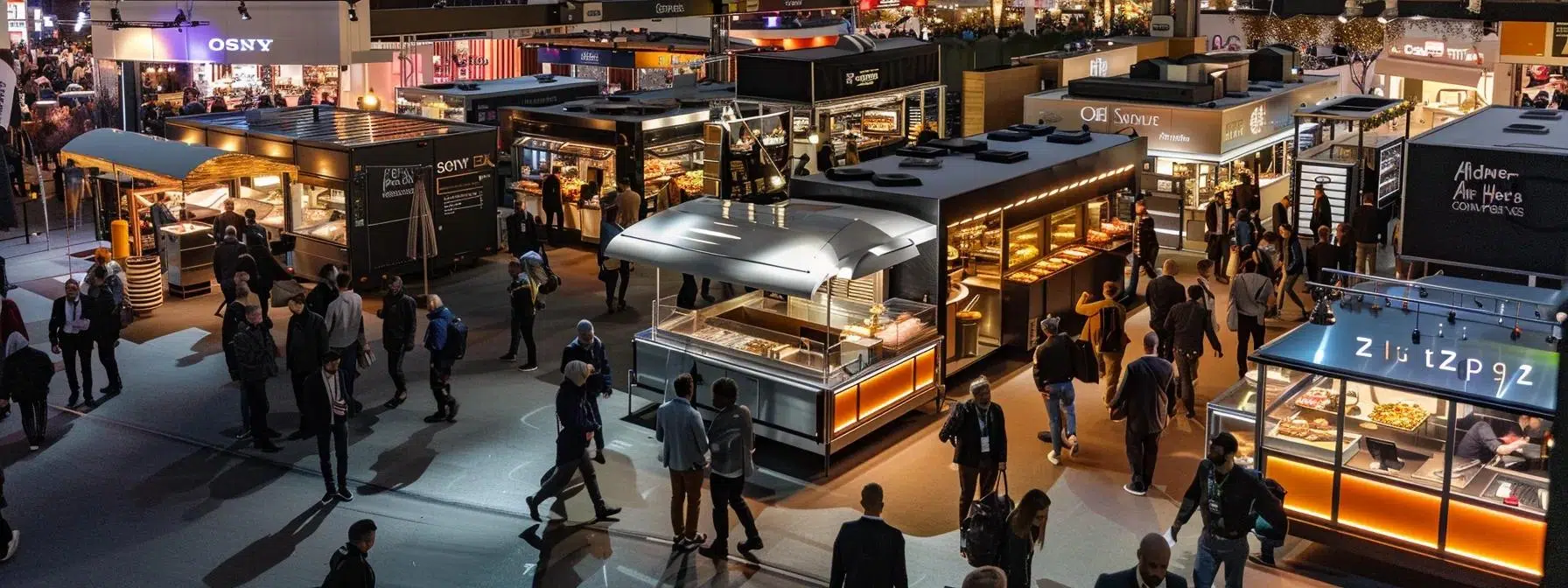
Mobile kitchens come in a range of types and sizes to meet the diverse needs of different event formats. Whether you’re planning a street food festival, a wedding reception, or a corporate retreat, there’s a mobile kitchen layout suited to your menu requirements, guest count, and space constraints. Choosing the right type ensures efficient food prep, smooth workflow, and proper setup within your venue’s logistics.
What Features Define Food Truck Conversion Kitchens?
Food truck conversions are compact, fully enclosed kitchen units built into repurposed vehicles. They’re ideal for events in tight spaces or high-traffic urban areas where mobility is key.
Typical features include:
- Small-scale burners and ovens.
- Built-in refrigeration and dry storage.
- Compact workstations designed for fast-paced cooking.
Best suited for: Street fairs, food truck events, casual outdoor parties, or pop-up brand activations.
How Do Trailer Kitchens Differ From Other Mobile Kitchens?
Trailer kitchens are larger, towable units that function like full-service commercial kitchens. They offer expanded space for meal prep and accommodate larger teams.
Key features include:
- Full-size ovens and cooktops.
- Multiple prep stations and deep storage.
- Room for several staff to work simultaneously.
Best suited for: Weddings, multi-day festivals, corporate events, or high-volume catering scenarios.
What Are the Benefits of Pop-Up Kitchens for Events?
Pop-up kitchens are temporary, modular setups that can be assembled on-site. They offer flexibility in layout and configuration, making them a practical choice for short-term or customized setups.
Advantages include:
- Portable components for flexible arrangements.
- Equipment can be added or removed based on menu complexity.
- Lower cost compared to food trucks or trailer kitchens.
Best suited for: Backyard celebrations, short-term catering needs, or remote locations with limited access.
How Do Mobile Kitchen Sizes Affect Event Suitability?
The size of the mobile kitchen you rent plays a major role in event efficiency. Consider the following when evaluating kitchen scale:
- Small kitchens: Great for intimate gatherings (e.g., private dinners, birthday parties) with limited menu variety.
- Mid-size units: Ideal for mid-range guest counts (e.g., weddings or corporate luncheons).
- Large kitchens: Built for high-capacity events (e.g., festivals, fundraisers), offering the space and power needed for volume cooking.
Choosing the right size helps match cooking capacity with guest needs, while ensuring all necessary equipment—from sinks to griddles—is included for a smooth operation.
What Are the Benefits of Using Full-Service Mobile Kitchens for Events?
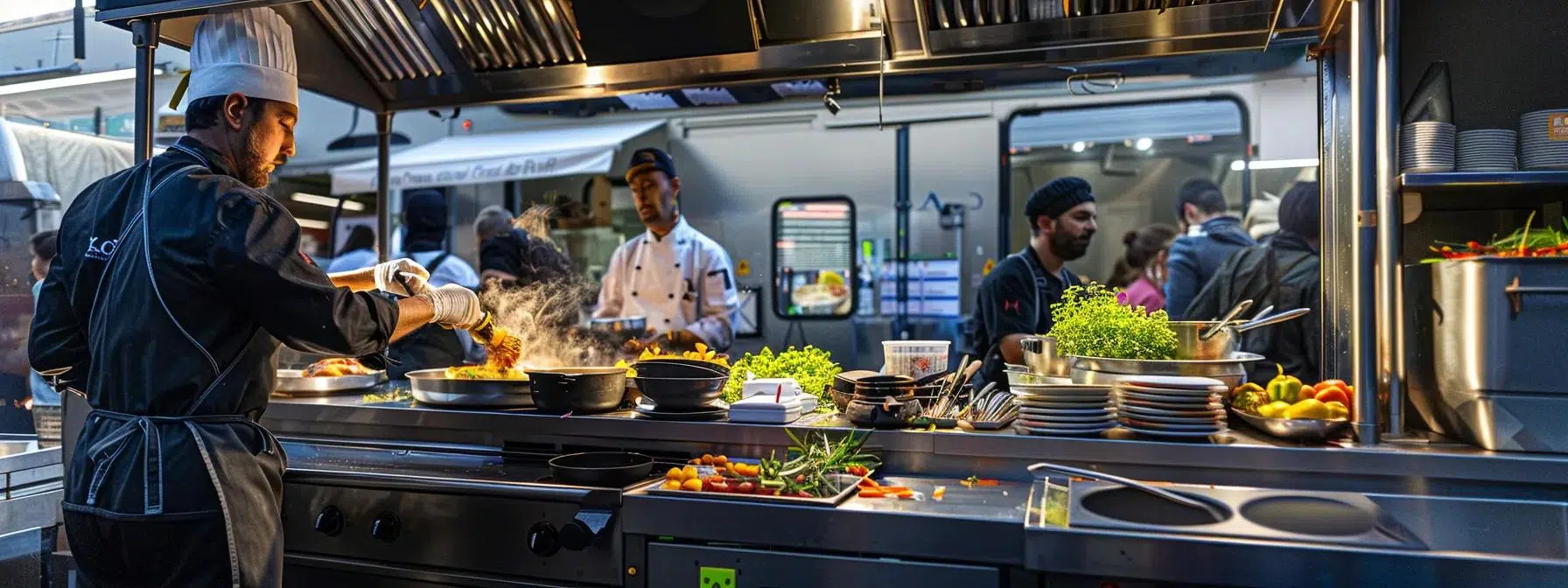
Mobile kitchen rentals provide a flexible, efficient solution for event planners who need on-site food preparation in locations without permanent kitchen infrastructure. These units are fully equipped with commercial-grade appliances and designed to support seamless catering operations at outdoor venues, private properties, or unconventional event spaces.
Key advantages include:
- Eliminating the need for access to built-in kitchens.
- Supporting fresh, real-time food prep on location.
- Simplifying setup by combining equipment, prep space, and safety systems in one unit.
- Offering scalable solutions for everything from small private gatherings to large public events.
How Does Convenience Improve Event Planning?
Mobile kitchens streamline planning by reducing the number of vendors and equipment sources involved in your event. Instead of coordinating separate kitchen setups, equipment rentals, and prep areas, a single mobile kitchen provides all the essentials in one unit.
This improves:
- Setup efficiency – Fewer moving parts mean faster installation and takedown.
- Flexibility – Units can be positioned in a variety of locations, regardless of venue limitations.
- Coordination – Simplified logistics free up time for focusing on other aspects of the event, such as guest experience, layout, and lighting.
Why Is Professionalism Important in Mobile Kitchen Rentals?
Mobile kitchens are designed to meet professional food service standards. The quality and reliability of the equipment directly impact the success of the event.
Professional features include:
- Commercial-grade appliances like convection ovens and refrigeration units.
- Built-in sanitation features including sinks and dishwashing stations.
- Safety systems such as fire suppression (e.g., Ansul systems) and temperature controls.
- Compliance with health department and safety codes.
These features help ensure smooth service, reduce operational risks, and support positive guest experiences.
How Does Customization Enhance the Event Experience?
Mobile kitchens can be tailored to fit the specific needs of each event, giving planners and caterers the flexibility to deliver a highly personalized experience.
Customization options may include:
- Selecting specific equipment based on menu requirements (e.g., extra fryers or warming cabinets).
- Configuring kitchen layouts to match space limitations or staffing plans.
- Adding branding elements or coordinating the unit’s appearance with the event theme.
This adaptability makes mobile kitchens a strong choice for events with unique culinary goals or aesthetic needs.
What Types of Events Benefit Most From Mobile Kitchens?
Mobile kitchens are well-suited for a wide range of events that require reliable, on-location food preparation:
- Outdoor festivals – where fixed infrastructure isn’t available.
- Corporate retreats and offsite meetings – needing consistent catering support.
- Weddings and private celebrations – held in backyards, vineyards, or rural properties.
- Public gatherings or fundraisers – with high guest turnout and diverse menu needs.
Their flexibility, durability, and professional capabilities make them a smart solution for any event that demands fresh, on-site food service without the limitations of a permanent kitchen.
How Do Mobile Kitchens Comply With Permits and Regulations?
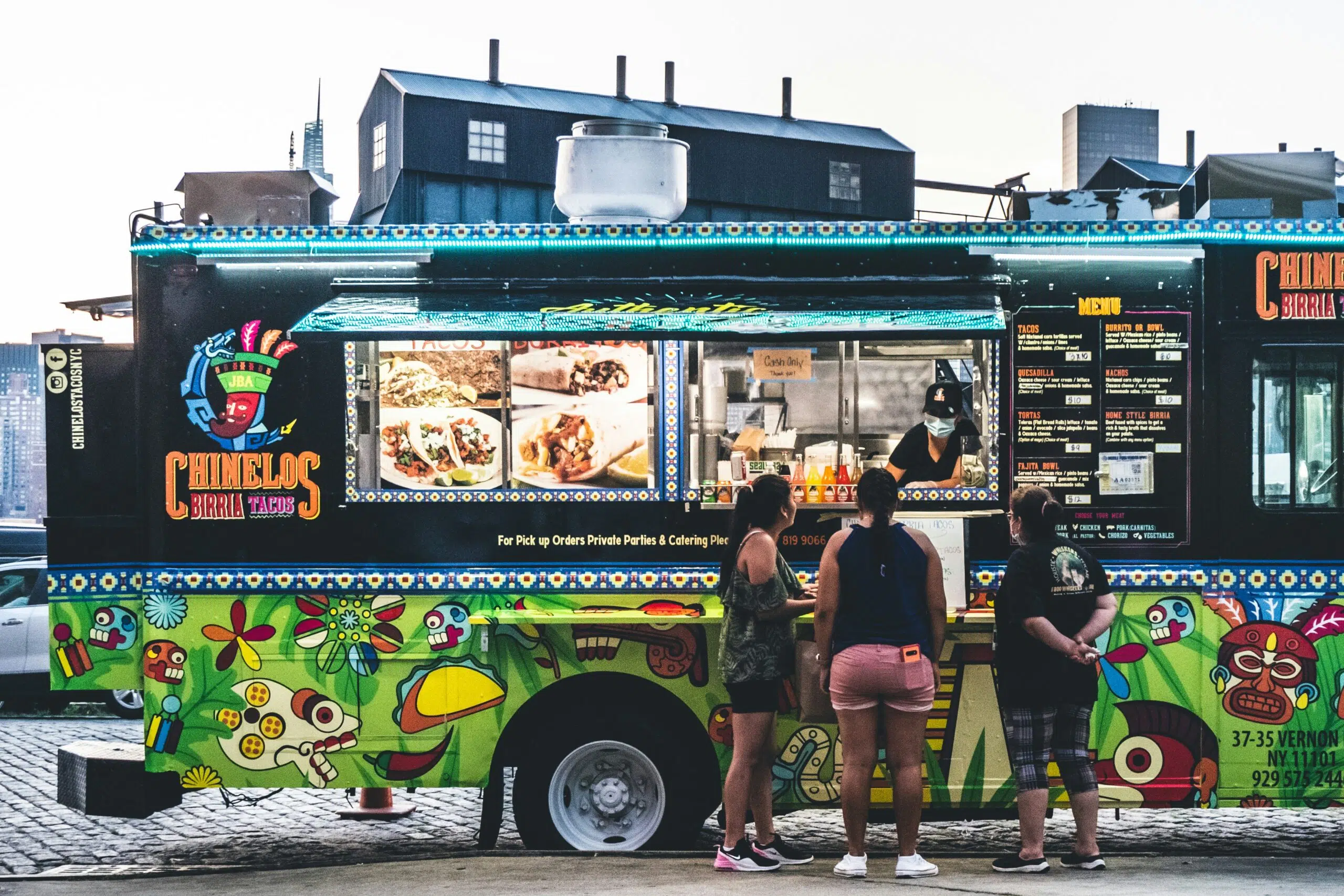
Mobile kitchen rentals must meet the same health and safety standards as permanent commercial kitchens. Event rental providers typically assist with the permitting process and ensure that each unit is properly equipped and compliant before delivery.
Key areas of compliance include:
- Obtaining local health department approvals and temporary food service permits.
- Meeting sanitation, water, and waste disposal guidelines.
- Adhering to building, fire, and safety codes through coordination with local authorities.
By working with experienced providers, event planners can ensure all required documentation and inspections are completed in advance, reducing delays and ensuring peace of mind.
What Permits Are Required for Mobile Kitchen Operations?
Depending on your location and event type, the following permits may be required:
- Temporary food service permits – Required for on-site meal prep.
- Health department clearance – Verifies the kitchen meets sanitation standards.
- Special event permits – Sometimes required for large public events or private gatherings on non-commercial property.
Many rental providers assist with completing paperwork and can offer guidance during health inspections to ensure your kitchen is fully approved before the event.
How Is Food Safety Maintained in Mobile Kitchens?
Mobile kitchens are built to uphold strict food safety practices. Common safety measures include:
- Temperature-controlled refrigeration and storage – Keeps food within safe temperature ranges.
- Regular cleaning protocols – Built-in sinks and dishwashing areas allow for continuous sanitation.
- Fire suppression systems – Most units are equipped with safety systems (e.g., Ansul) to reduce fire risk.
- Compliance training – Rental providers may offer operational guidelines or work with your caterer to ensure proper hygiene standards are followed.
These measures help reduce the risk of contamination and support safe, high-quality food service.
What Are Common Venue Requirements for Mobile Kitchens?
Before setup, venues typically require confirmation that the mobile kitchen meets specific site standards. These may include:
- Electrical hookups or generator access – To power ovens, refrigeration, and lighting.
- Water supply and drainage – For sinks, prep areas, and dishwashing stations.
- Designated waste disposal areas – For gray water and trash.
- Permit and insurance documentation – Showing compliance with local codes and liability coverage.
Rental providers often perform a pre-event site check or provide a checklist to ensure the kitchen can be installed safely and operates without disruption on event day.
How Can You Maximize Your Event With Mobile Kitchen Services?
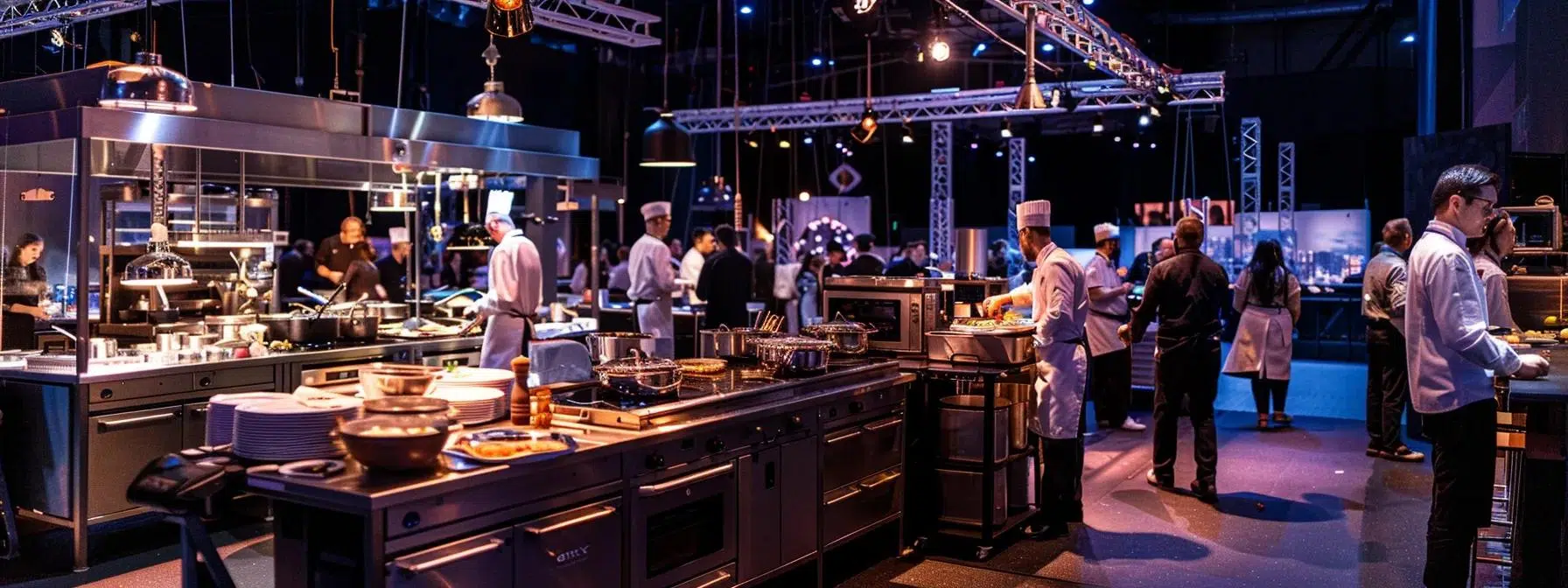
Maximizing your event involves detailed planning, efficient logistics, and creative integration of culinary services. Coordination with expert chef teams, customized menu planning, and modern visual content showcasing the mobile kitchen can significantly enhance the overall guest experience.
What Should Event Planners Know About Mobile Kitchen Logistics?
Event planners must consider: – Site accessibility, power, and water supply. – Parking or staging areas for the mobile kitchen. – Detailed planning of arrival times, loading procedures, and contingency plans for inclement weather. Thorough logistical coordination minimizes issues on the event day.
How Can Chef Profiles Help You Choose the Right Culinary Expert?
Chef profiles provide: – Insights into culinary expertise, menu style, and past event performance. – Reviews, sample menus, and certifications for informed decision-making. This transparency ensures the selected chef meets the event’s specific dietary and thematic requirements.
What Are Best Practices for Coordinating Catering With Mobile Kitchens?
Best practices include: – Clear communication among event planners, mobile kitchen providers, and chefs. – Establishing a timeline, finalizing menus, and agreeing on service protocols well in advance. – Regular pre-event updates and checklists to ensure equipment and staffing readiness. Such coordination guarantees a smooth, well-orchestrated culinary experience.
How Can Video and Visual Content Showcase Mobile Kitchen Options?
High-quality videos and photos can: – Demonstrate the setup process and behind-the-scenes cooking. – Feature testimonials from satisfied customers. – Highlight modern equipment like convection ovens and deep fryers, and the integration of the kitchen into various event settings. These visual tools build credibility and help clients visualize how mobile kitchens can enhance their events.
| Mobile Kitchen Type | Key Feature | Ideal Use Case | Capacity |
|---|---|---|---|
| Food Truck Conversion | Compact yet fully functional | Urban events, street food fairs | Small to medium |
| Trailer Kitchen | Spacious layout with full-service setup | Large events, festivals, corporate meetings | Medium to large |
| Pop-Up Kitchen | Modular, temporary installation | Private gatherings, short-term catering | Variable |
This table summarizes key features and capacities, aiding in the selection of the most suitable mobile kitchen option.
Frequently Asked Questions
What makes mobile kitchen rentals ideal for outdoor events?
Mobile kitchens offer everything needed for safe, on-site food preparation, including commercial equipment and support for catering staff. They work well in areas without built-in kitchen infrastructure.
How far in advance should I book a mobile kitchen rental?
Booking at least 2–4 weeks ahead is recommended, especially for large events. However, some providers may offer last-minute rentals at higher rates.
Can I customize the kitchen equipment or layout?
Yes. Many rental companies offer modular options, allowing you to choose equipment like ovens, fryers, sinks, or refrigeration units based on your event’s needs.
Do I need permits to use a mobile kitchen?
Yes. You may need temporary food service permits, health department clearances, and possibly event-specific approvals. Many providers assist with the permit process.
Is chef service included with mobile kitchen rentals?
Not typically. Most rental companies provide the kitchen and equipment only, but they can coordinate with your caterer or chef as needed.
How is food safety maintained in mobile kitchens?
Mobile kitchens use temperature-controlled storage, built-in cleaning stations, and meet commercial kitchen safety standards, including fire suppression and sanitation protocols.
Conclusion
Mobile event kitchen rentals offer a practical and professional solution for events that need on-site cooking without access to a built-in kitchen. With customizable layouts, durable equipment, and compatibility with third-party chefs or catering teams, they simplify food service logistics for outdoor and remote locations. By selecting the right kitchen type, planning for power and water access, and coordinating equipment needs ahead of time, you can deliver a seamless catering experience that enhances guest satisfaction. For planners looking to provide high-quality meals without sacrificing convenience or safety, mobile kitchens are a smart, scalable rental choice.






